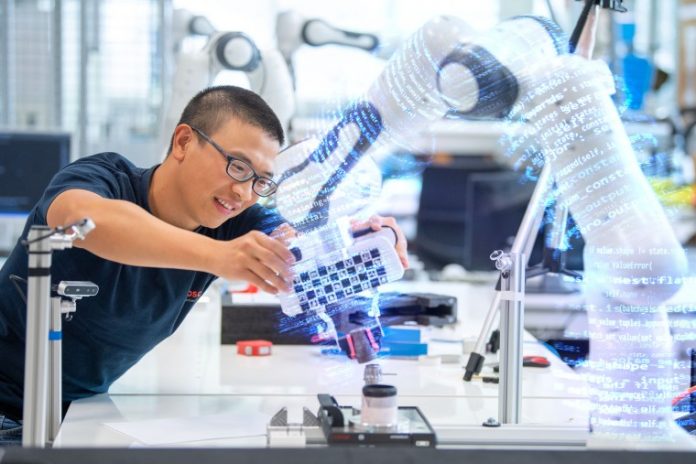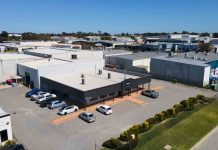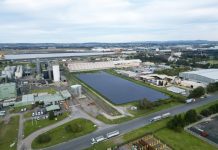
Media Release
Industry 4.0 is coming of age. What began at Hannover Messe in 2011 as a “pioneering German project” has now gained global traction – thanks in part to groundbreaking work by Bosch.
The aim is for connected manufacturing to optimize itself automatically, making it economical to produce customized products in batch sizes even as small as one. Since 2012, Bosch has been systematically leading factories – both its own and those of its customers – into this new industrial age. This commitment is paying off: over the past ten years, the company has generated more than four billion euros in sales with Industry 4.0. In 2020 alone, Bosch generated sales of more than 700 million euros with connected manufacturing solutions.
“We recognised the potential of Industry 4.0 early on and are pioneers in this field. Now we’re reaping the rewards,” says Rolf Najork, the member of the Bosch board of management, responsible for industrial technology.
Industry 4.0 at Bosch
The use of Industry 4.0 in the Bosch’s own plants is also paying off. Bosch is combining intelligent software for production control, monitoring, and logistics planning into a manufacturing platform of its own. This connects to a larger database that simplifies and improves tasks such as AI analyses for fault detection The roll-out of the new Bosch manufacturing and logistics platform will start at the end of 2021. “We offer our 240 or so plants a standardised ‘Industry 4.0 toolbox,’ which can be expanded and deployed as needed,” Najork says. Bosch believes this will save it almost one billion euros over the next five years, following an investment of around 400 million euros.
The beginnings: Bosch does pioneering work on Industry 4.0
Back in 2011 at Hannover Messe, scientists presented an idea that broke with convention. Rather than have people adapt to machines, they turned things around. The vision here was of products that actively involve themselves in their manufacturing, navigate themselves through the production process, and communicate with humans and machines. It was the birth of Industry 4.0 – Bosch is one of its founding fathers. In 2012, the company took over the chairmanship of the newly established Industry 4.0 working group to further develop the German government’s high-tech strategy. Bosch became a leading provider and a leading user of Industry 4.0, not only testing this modern form of manufacturing in its own plants, but also bringing proven solutions to the market. The Bosch plants in Blaichach in Germany, Anderson in the U.S., and Wuxi and Suzhou in China were pioneers in this domain and have been the recipient of multiple awards for their innovative concepts, including the designation of “lighthouse factories” by the World Economic Forum.
Leader for Industry 4.0 in Australia
Bosch Australia’s Manufacturing Solutions Division (BAMS) was established in 2014 in response to growing demands from Australian manufacturers for support to automate their factories and apply the latest technologies for cost and quality improvement.
Six years on, BAMS is now a leading supplier of factory automation, advanced manufacturing solutions, and i4.0 consulting to Australian businesses. A past winner of the Victorian Manufacturing Hall of Fame Awards for Leader in Industry 4.0, BAMS is supplying complex turnkey solutions to the MedTech, Food and Beverage, and Advanced Manufacturing sectors.
Amongst many other projects, BAMS has recently been enlisted to automate the high volume manufacturing of Covid-19 test devices for Brisbane-based digital diagnostics company Ellume, and to automate materials handling for CSL Behring at its manufacturing site in Melbourne.
“With a growing portfolio of factory automation projects, BAMS is fast becoming the leading supplier of bespoke process automation solutions in Australia.” said Gavin Smith, President of Bosch Oceania.
The status quo: Bosch is making Industry 4.0 the norm
“Pilot projects are a good approach for trying things out and getting ideas out there. Now it’s time to up the tempo: we need to make Industry 4.0 the norm,” Najork says. Bosch uses its own academies and training courses to train associates for Industry 4.0 and also makes this offering available to customers. Najork is convinced that “Industry 4.0 is not an end in itself. It’s a way to maintain competitiveness. In the future, nothing will be possible without digitalization.” Bosch projects deliver measurable benefit: connected solutions increase productivity by as much as 25 percent, boost machine availability by up to 15 percent, and reduce maintenance costs by as much as 25 percent. “If we want to exploit the potential of Industry 4.0, we have to move away from isolated solutions. In Bosch plants, there are now over 120,000 connected machines and over 250,000 devices such as integrated cameras or robots. Some 22,000 machine controllers alone are connected via the Nexeed software for Industry 4.0 developed by Bosch Connected Industry. At Hannover Messe, Bosch Rexroth is presenting its ctrlX Automation platform. Based on app technology and web engineering, this open, 5G-enabled control technology enables co-creation. The idea behind it is for users to either use apps provided by Bosch Rexroth and third-party providers, or to develop apps themselves and share them with other companies within an ecosystem. “By making developments participatory,” Najork says, “we can create network effects and let ideas take wing.”
Future prospects: Bosch combines Industry 4.0 with other technologies
The foundation has been laid. “Our focus is on harnessing and combining the power of different technologies. Bosch is becoming an AIoT company. We’re bringing artificial intelligence and the internet of things together,” Najork says. At Hannover Messe, Bosch is presenting the Balancing Energy Network, an AI-based energy management system that employs intelligent software to control and optimize energy flows in factories. Originally developed for manufacturing facilities, the software has the potential to help all types of larger building complexes reduce their environmental footprint, including hospitals, shopping malls, and sports arenas. Technology and knowledge are fundamental stepping stones on the path to climate-neutral manufacturing. These developments show that “factories are once again becoming a source of innovation,” Najork says. For the future, he believes three principles are crucial: “First, we have to see Industry 4.0 in holistic terms and focus on end-to-end factory solutions. Second, we need an open architecture to be compatible and user-friendly both in the plants themselves and vis-à-vis customers and suppliers. And third, we must ensure flexibility: in the future, customers will increasingly want customized products. As long as we keep these principles in balance, the ideas that emerge from the manufacturing industry will change the world for the better.”


















